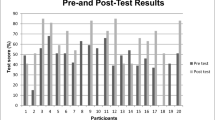Abstract
Introduction
Pakistan has a population of over 200 million with only 75 trained rheumatologists. To address the needs of rheumatology care, it is of paramount importance to train the primary care physician as a first line of defense.
Methods
The project “Empowering Family Physicians; fighting disability” was the recipient of a 2018 ILAR grant. This project began with development of an evidence-based curriculum using ACR Rheum2learn modules along with guidelines from international societies. A blended learning approach was chosen with nine online learning modules sandwiched between two face-to-face sessions. Participants’ assessment entailed quizzes, clinical scenarios, and portfolio development all completed online, while face-to-face sessions relied upon power-point presentations and an objective structured clinical examination. Course impact was assessed with pre-course and post-course questionnaires. Overall perception of the training was evaluated through candidate feedback.
Results
Participants were enrolled from across the country totaling 48 health care providers (44 family physicians and 4 allied health professionals). The adherence to face-to-face sessions was 82.5% and 63.6% for the online component. The mean score for post-course assessment (mean = 2.369, SD = 0.3425) was significantly higher than for the pre-course assessment (mean = 1.792, SD = 0.4838) with statistically significant difference of, t (12) = − 7.756, p < 0.0001 (confidence interval: − 0.7390 to − 0.4149). The perception of the strategy was positive with 80% strongly satisfied with the workshops and presentations.
Conclusion
Empowering family physicians by training them in rheumatology care can be an effective tool to fight unmet needs in access to musculoskeletal health care. We plan to offer a shortened version of the course at regular intervals.
Key Points • Pakistan has a huge shortage of rheumatology care with only 75 rheumatologists caring for a population of over 200 million. • To improve access to rheumatology care,the “Empowering Family Physicians; Fighting disability” course was launched in 2018 with the help of anILAR grant. • A blended learning approach comprising of 9 online modules sandwiched between two face-to-face sessions was chosen. • A statistically significant difference between pre- and post-courseself-assessment of participantssuggests that the courseis an effective tool for teaching Family Physicians. |


Similar content being viewed by others
References
Department of Economic and Social Affairs, Population Division, United Nations (2017) World Population Prospects, The 2017 Revision.https://esa.un.org/unpd/wpp/publications/Files/WPP2017_KeyFindings.pdf. Accessed 2019 Apr 20.
Farooqi A, Gibson T (1998 May) Prevalence of the major rheumatic disorders in the adult population of north Pakistan. Br J Rheumatol 37(5):491–495
Hameed K, Gibson T, Kadir M, Sultana S, Fatima Z, Syed A (1995 Mar) The prevalence of rheumatoid arthritis in affluent and poor urban communities of Pakistan. Br J Rheumatol 34(3):252–256
Hoy DG, Smith E, Cross M, Sanchez-Riera L, Blyth FM, Buchbinder R, et al. Reflecting on the global burden of musculoskeletal conditions: lessons learnt from the global burden of disease 2010 study and the next steps forward (2015) Ann Rheum Dis; 74(1):4–7.
Harrison MJ, Deighton C, Symmons DPM (2008) An update on UK rheumatology consultant workforce provision: the BSR/ARC Workforce Register 2005-07: assessing the impact of recent changes in NHS provision. Rheumatology 47(7):1065–1069
Reveille JD, Muñoz R, Soriano E, Albanese M, Espada G, Lozada CJ et al (2016) Review of Current Workforce for Rheumatology in the Countries of the Americas 2012-2015. J Clin Rheumatol 22(8):405–410
International Conference on Primary Health Care, USSR, Alma-Aty (1978) World Health Organization. http://www.who.int/iris/handle/10665/39228.
WHO | The World Health Report 2008 - primary Health Care (Now More Than Ever) (2013). WHO. https://www.who.int/whr/2008/en/. Accessed 2019 Apr 20.
Rheum2Learn (Internet) https://www.rheumatology.org/Learning-Center/Educational-Activities/Rheum2Learn. Accessed 2019 Apr 20.
Pereira da Silva JA, Woolf AD (2010) Rheumatology in Practice. Springer, London
Berman JR, Aizer J, Bass AR, Blanco I, Davidson A, Dwyer E et al (2016 Aug 20) Fellow use of medical jargon correlates inversely with patient and observer perceptions of professionalism: results of a rheumatology OSCE (ROSCE) using challenging patient scenarios. Clin Rheumatol 35(8):2093–2099
Hosie GA (2000 Jul) Teaching rheumatology in primary care. Ann Rheum Dis 59(7):500–503
Helliwell T, Mallen C, Peat G, Hay E (2014 Jul) Research into practice: improving musculoskeletal care in general practice. Br J Gen Pract 64(624):372–374
Pakistan Medical and Dental Council Statistics (2018) http://www.pmdc.org.pk/statistics/tabid/103/default.aspx. Accessed 2019 Apr 20.
Liu Q, Peng W, Zhang F, Hu R, Li Y, Yan W. (2016 Jan 4)The Effectiveness of Blended Learning in Health Professions: Systematic Review and Meta-Analysis. J Med Internet Res;18(1):e2.
Stewart GD, Khadra MH (2009) The continuing medical education activities and attitudes of Australian doctors working in different clinical specialties and practice locations. Aust Health Rev 33(1):47
Financial Disclosures
-
1.
The course “Empowering family physicians; fighting disability” was funded by The International League of Associations for Rheumatology educational grant.
-
2.
This research was in part supported by the Intramural Research Program of the National Institute of Arthritis and Musculoskeletal and Skin Diseases of the National Institutes of Health.
Funding
ILAR for funding the project; “Empowering family physicians; fighting disability” in 2018.
Dr. SameeyaAfzal, Head of Family Medicine Department Fatima Memorial System and her team.
Dr. Amina Ahmad, Director Department of Medical Education, Fatima Memorial System
Ms. AfshanKhanum, Bio-statistician at Fatima Memorial Hospital College of Medicine & Dentistry.
This research was in part supported by the Intramural Research Program of the National Institute of Arthritis and Musculoskeletal and Skin Diseases of the National Institutes of Health.
Author information
Authors and Affiliations
Corresponding author
Additional information
Publisher’s note
Springer Nature remains neutral with regard to jurisdictional claims in published maps and institutional affiliations.
Part of the Topical Collection entitled ‘Empowering Medical Education to Transform: Learnings from an international perspective’
Rights and permissions
About this article
Cite this article
Khan, S.E.A., Saeed, M.A., Batool, S. et al. A rheumatology curriculum in Pakistan for empowering family physicians and fighting disability. Clin Rheumatol 39, 681–687 (2020). https://doi.org/10.1007/s10067-019-04797-7
Received:
Revised:
Accepted:
Published:
Issue Date:
DOI: https://doi.org/10.1007/s10067-019-04797-7




